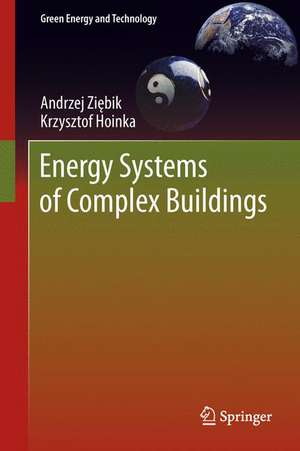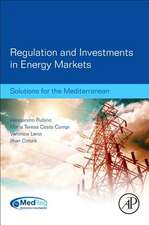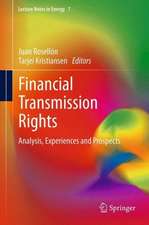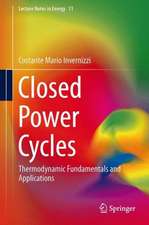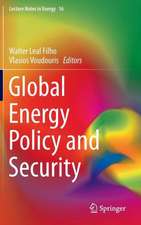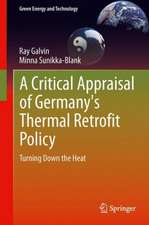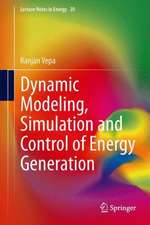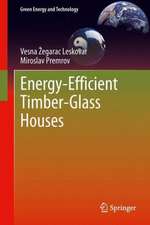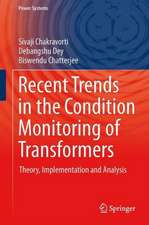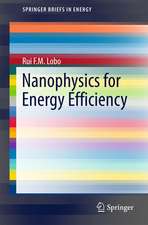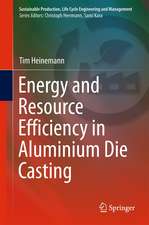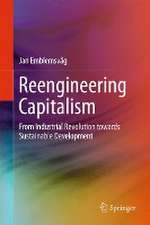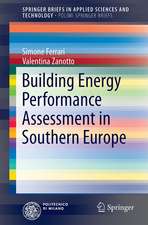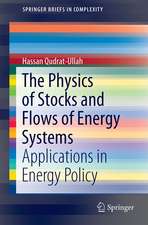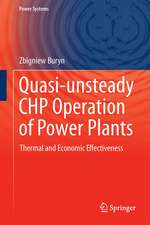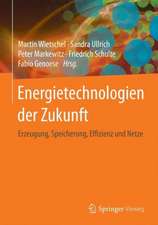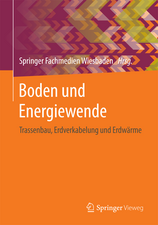Energy Systems of Complex Buildings: Green Energy and Technology
Autor Andrzej Ziębik, Krzysztof Hoinkaen Limba Engleză Hardback – 12 oct 2012
Energy Systems of Complex Buildings presents the system approach to the energy-ecological analysis of energy management in complex buildings. Mathematical models of balancing the direct energy consumption, as well as cumulative energy consumption and cumulative emission of noxious substances are based on input-output analysis. Algorithms devoted to system analysis in the exploitation of energy management of complex buildings are included. In the case of ecological analysis, a new approach is presented basing on the idea of thermoecological costs. In this way, two groups of noxious influence (depletion of non-renewable energy resources and emissions of noxious substances) are taken into account. The LCA energy-ecological analysis of complex buildings has also been presented.
Students, building designers, energy auditors, and researchers will learn the methodology of evaluating the energy and ecological effects by applying new technologies and devices in buildings, which influence future investigations concerning the energy and ecological analysis of complex buildings.
| Toate formatele și edițiile | Preț | Express |
|---|---|---|
| Paperback (1) | 947.50 lei 6-8 săpt. | |
| SPRINGER LONDON – 9 noi 2014 | 947.50 lei 6-8 săpt. | |
| Hardback (1) | 648.24 lei 6-8 săpt. | |
| SPRINGER LONDON – 12 oct 2012 | 648.24 lei 6-8 săpt. |
Din seria Green Energy and Technology
- 18%
 Preț: 943.43 lei
Preț: 943.43 lei - 20%
 Preț: 629.52 lei
Preț: 629.52 lei - 18%
 Preț: 1124.92 lei
Preț: 1124.92 lei - 18%
 Preț: 947.35 lei
Preț: 947.35 lei - 15%
 Preț: 655.92 lei
Preț: 655.92 lei - 18%
 Preț: 957.62 lei
Preț: 957.62 lei - 18%
 Preț: 789.52 lei
Preț: 789.52 lei - 17%
 Preț: 464.55 lei
Preț: 464.55 lei - 15%
 Preț: 645.79 lei
Preț: 645.79 lei - 18%
 Preț: 903.93 lei
Preț: 903.93 lei - 24%
 Preț: 1322.07 lei
Preț: 1322.07 lei - 18%
 Preț: 890.54 lei
Preț: 890.54 lei - 18%
 Preț: 1115.46 lei
Preț: 1115.46 lei - 18%
 Preț: 1117.03 lei
Preț: 1117.03 lei - 18%
 Preț: 949.73 lei
Preț: 949.73 lei - 18%
 Preț: 892.11 lei
Preț: 892.11 lei - 15%
 Preț: 648.24 lei
Preț: 648.24 lei - 18%
 Preț: 997.09 lei
Preț: 997.09 lei - 15%
 Preț: 579.81 lei
Preț: 579.81 lei - 18%
 Preț: 1123.15 lei
Preț: 1123.15 lei - 18%
 Preț: 961.41 lei
Preț: 961.41 lei - 17%
 Preț: 490.22 lei
Preț: 490.22 lei - 18%
 Preț: 904.60 lei
Preț: 904.60 lei - 15%
 Preț: 643.34 lei
Preț: 643.34 lei -
 Preț: 287.90 lei
Preț: 287.90 lei - 24%
 Preț: 634.04 lei
Preț: 634.04 lei -
 Preț: 379.39 lei
Preț: 379.39 lei - 18%
 Preț: 783.20 lei
Preț: 783.20 lei - 18%
 Preț: 1394.84 lei
Preț: 1394.84 lei - 18%
 Preț: 1691.57 lei
Preț: 1691.57 lei - 18%
 Preț: 1112.48 lei
Preț: 1112.48 lei - 15%
 Preț: 592.61 lei
Preț: 592.61 lei - 18%
 Preț: 952.09 lei
Preț: 952.09 lei - 18%
 Preț: 944.19 lei
Preț: 944.19 lei - 18%
 Preț: 891.33 lei
Preț: 891.33 lei - 18%
 Preț: 1252.44 lei
Preț: 1252.44 lei - 18%
 Preț: 789.52 lei
Preț: 789.52 lei - 20%
 Preț: 566.29 lei
Preț: 566.29 lei - 18%
 Preț: 1113.71 lei
Preț: 1113.71 lei - 18%
 Preț: 1114.24 lei
Preț: 1114.24 lei - 24%
 Preț: 590.58 lei
Preț: 590.58 lei - 20%
 Preț: 567.49 lei
Preț: 567.49 lei - 24%
 Preț: 907.48 lei
Preț: 907.48 lei - 18%
 Preț: 952.89 lei
Preț: 952.89 lei - 18%
 Preț: 952.89 lei
Preț: 952.89 lei - 18%
 Preț: 950.52 lei
Preț: 950.52 lei
Preț: 648.24 lei
Preț vechi: 762.64 lei
-15% Nou
Puncte Express: 972
Preț estimativ în valută:
124.05€ • 129.35$ • 103.10£
124.05€ • 129.35$ • 103.10£
Carte tipărită la comandă
Livrare economică 21 martie-04 aprilie
Preluare comenzi: 021 569.72.76
Specificații
ISBN-13: 9781447143802
ISBN-10: 1447143809
Pagini: 284
Ilustrații: XIV, 346 p.
Dimensiuni: 155 x 235 x 27 mm
Greutate: 0.64 kg
Ediția:2013
Editura: SPRINGER LONDON
Colecția Springer
Seria Green Energy and Technology
Locul publicării:London, United Kingdom
ISBN-10: 1447143809
Pagini: 284
Ilustrații: XIV, 346 p.
Dimensiuni: 155 x 235 x 27 mm
Greutate: 0.64 kg
Ediția:2013
Editura: SPRINGER LONDON
Colecția Springer
Seria Green Energy and Technology
Locul publicării:London, United Kingdom
Public țintă
Professional/practitionerCuprins
Introduction Into Systems Analysis.- Large Energy Systems.- Mathematical Modeling and Optimization of Energy Systems.- Energy Management of Complex Buildings as a System.- Supply of Heat, Cogeneration and Trigeneration.- Systems Approach to Energy-Ecological Analysis of Complex Buildings.- Systems Analysis of the Exploitation of Energy Management in Complex Buildings – Examples of Applications.- Life Cycle Assessment of Energy Systems in Complex Buildings.- Choice of the Structure of the Energy System of Complex Buildings in the Course of Preliminary Design.
Notă biografică
Andrzej Ziębik, Ph.D. D.Sc., Full Professor, graduated from the Silesian University of Technology, and was one of the first researchers in Poland working in the domain of applying the method of system analysis in energy management. His PhD thesis was devoted to mathematical modeling of industrial energy management on the example of ironworks. System analysis in industrial energy engineering was the topic of several PhD theses supervised by him. His book Mathematical modelling of energy management systems in industrial plants (Polish Academy of Science, Ossolineum 1990) was a summary of his and his PhD students’ works in the domain of system analysis in industrial energy engineering. His research interest was later extended, comprising system analysis in power and CHP plants, as well as municipal energy engineering. The latter topic was dealt with within the frame of Krzysztof Hoinka’s PhD thesis under his supervision. Professor Ziębik is the author or co-author of 17 books and over 300 periodical and conference papers.
Krzysztof Hoinka, PhD is an assistant professor at the Institute of Thermal Technology in the Silesian University of Technology in Poland. He is the author and co-author of 26 scientific publications. Fields of interest include mathematical modeling of energy management in complex buildings, optimization of thermal processes, combined heat and power generation, energy-environmental analysis.
Krzysztof Hoinka, PhD is an assistant professor at the Institute of Thermal Technology in the Silesian University of Technology in Poland. He is the author and co-author of 26 scientific publications. Fields of interest include mathematical modeling of energy management in complex buildings, optimization of thermal processes, combined heat and power generation, energy-environmental analysis.
Textul de pe ultima copertă
The production and consumption of energy carriers in complex buildings take place within the network of interconnected energy processes. For this reason, a change carried out in one energy process influences other energy processes. Therefore, all balance equations of energy carriers should be investigated as a whole, and energy management of complex buildings creates a large energy system with internal relationships between energy installations and the equipment, as well as external relationships with the environment.
Energy Systems of Complex Buildings presents the system approach to the energy-ecological analysis of energy management in complex buildings. Mathematical models of balancing the direct energy consumption, as well as cumulative energy consumption and cumulative emission of noxious substances are based on input-output analysis. Algorithms devoted to system analysis in the exploitation of energy management of complex buildings are included. In the case of ecological analysis, a new approach is presented basing on the idea of thermoecological costs. In this way, two groups of noxious influence (depletion of non-renewable energy resources and emissions of noxious substances) are taken into account. The LCA energy-ecological analysis of complex buildings has also been presented.
Students, building designers, energy auditors, and researchers will learn the methodology of evaluating the energy and ecological effects by applying new technologies and devices in buildings, which influence future investigations concerning the energy and ecological analysis of complex buildings.
Energy Systems of Complex Buildings presents the system approach to the energy-ecological analysis of energy management in complex buildings. Mathematical models of balancing the direct energy consumption, as well as cumulative energy consumption and cumulative emission of noxious substances are based on input-output analysis. Algorithms devoted to system analysis in the exploitation of energy management of complex buildings are included. In the case of ecological analysis, a new approach is presented basing on the idea of thermoecological costs. In this way, two groups of noxious influence (depletion of non-renewable energy resources and emissions of noxious substances) are taken into account. The LCA energy-ecological analysis of complex buildings has also been presented.
Students, building designers, energy auditors, and researchers will learn the methodology of evaluating the energy and ecological effects by applying new technologies and devices in buildings, which influence future investigations concerning the energy and ecological analysis of complex buildings.
Caracteristici
Gives detailed information about mathematical modeling of energy systems of complex buildings Discusses how to manage the consumption of energy in complex buildings Enables readers to make the appropriate choice of energy management structure Includes supplementary material: sn.pub/extras
